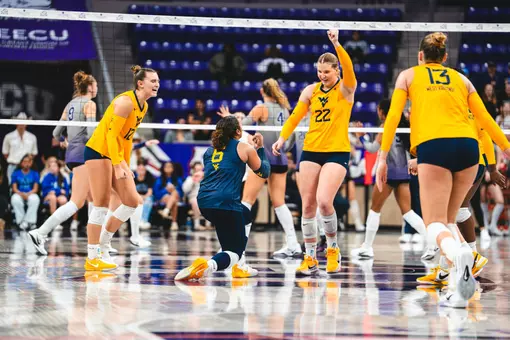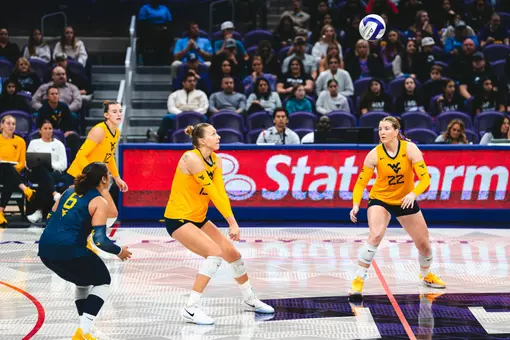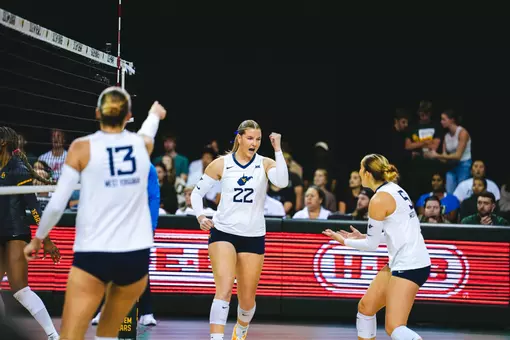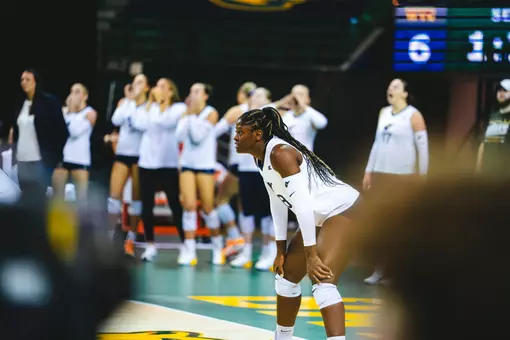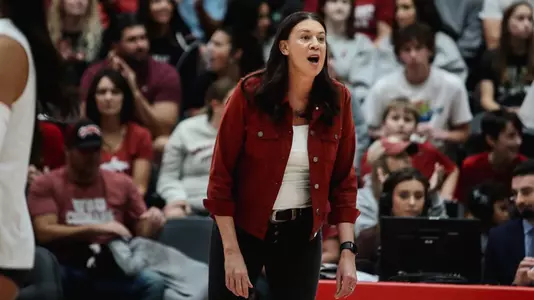
Greeny Ready for Next Challenge at West Virginia
January 02, 2024 04:09 PM | Volleyball, Blog
MORGANTOWN, W.Va. – If you are a volleyball player, parent, coach, official or fan eager to see the sport grow in West Virginia, well, your time has finally arrived.
That's because Wren Baker served an ace when he hired Washington State's Jen Greeny late last month to take over the reins of the Mountaineer program. It was a clear signal to everyone involved in women's college volleyball that Baker is serious about supporting a first-rate program at WVU, something that's been elusive for the Mountaineers in what will soon be their 50th anniversary campaign in 2024.
Of course, volleyball at West Virginia was born out of Title IX and became a varsity sport in 1974. The team had some success competing against a predominantly small-college schedule through the early 1980s before it transitioned to the Atlantic 10 Conference.
West Virginia had one team in 1991 win 26 games and advance to volleyball's version of the NIT, and there were a handful of winning seasons when the Mountaineers joined the Big East in 1995, but there were more lean years than successful ones.
The move to the Big 12 in 2012 saw West Virginia lose all 16 conference matches that first season, and the Mountaineers have struggled mightily to keep their heads above water during their 12-year association in a conference that boasts some of the top volleyball programs in the country, including 2023 national champion Texas.
West Virginia has had only two .500 seasons and two others with six wins in Big 12 play and shows an overall winning percentage of just .234 in its 184-match history in the league.
After earning its only NCAA Tournament bid in school history in 2021, West Virginia fell to 7-22 two years ago and then to 9-22 in 2023. Its Big 12 record over the last two seasons was 2-32, which necessitated a change in direction.
And the course Baker chose to take was certainly eye opening.
Jen Greeny is one of the most recognizable names in women's collegiate volleyball. She was just the seventh player in Washington State history to reach 1,000 career kills and was a three-time All-Pac 10 performer during her four-year career in Pullman. She returned to her alma mater in 2011 after building Lewis Clark-State College in Lewiston, Idaho, into an NAIA volleyball power.
It took Greeny and her recruiting coordinator/husband, Burdette, five seasons during the pre-transfer portal era before they were able to develop a team good enough to make the NCAA Tournament in 2016.
They've made it to the tournament every year since.
Twice, Greeny was named Pac-12 Coach of the Year and twice her teams reached the NCAA Tournament round of 16, including this past season when her Cougars won 26 matches and finished ranked 11th in the final American Volleyball Coaches Association (AVCA) rankings.
Her Division I head coaching credentials are as good as any coach West Virginia has hired in any sport in recent years, which makes Baker's hire so attention-getting.
"We were running two separate searches," Baker explained during an interview with Tony Caridi on the Mountaineer Sports Network's Duke's Mayo Bowl Special last week. "We were running one search to recruit her and another with some great candidates, but we always kept the dialog going with her."
Baker said when Greeny was in Tampa for the Women's Volleyball Final Four, he asked her to fly up to Morgantown to spend a few hours on campus with him and the search committee.
"She flew up and back the same day and just like all of us, she fell in love with Almost Heaven, and the next thing you know, we were cutting a deal," he said. "I'm really excited about what she's going to build."
Greeny, too, is excited about the opportunity to hit the reset button on her coaching career.
"The biggest thing for me was Wren Baker and the vision he has for West Virginia athletics and volleyball in particular," she said during a Zoom conference with media members in late December following the announcement of her hiring. "We love building programs; we've done it twice, once at a small, NAIA school, and once at Washington State."
Because West Virginia has little history and tradition, and is surrounded geographically by several outstanding volleyball programs, Greeny, initially, is going to have to rely on her good name to open doors.
The final 2023 AVCA poll released last month illustrates this.
Within the region, West Virginia will be battling the likes of fourth-ranked Pitt, sixth-ranked Louisville, ninth-ranked Tennessee, 10th-ranked Kentucky, 12th-ranked Penn State, 20th-ranked Dayton and 22nd-ranked Western Kentucky for prospects.
Of those, Pitt is the closest to West Virginia and the Panthers have become a national power without the benefit of having any Western Pennsylvania players on their roster. Pitt has developed a pipeline in California, and have players from Hawaii and Texas, among several other volleyball hotbed states.
Penn State predominantly recruits Pennsylvania and Ohio, but has players from Colorado, Illinois, Kentucky, Virginia, Delaware, Tennessee, North Carolina and Georgia.
The Big 12 is losing Texas to the SEC but is gaining 16th-ranked Arizona to complement a strong conference that includes 17th-ranked Kansas, 18th-ranked BYU, 21st-ranked Houston and 23rd-ranked Baylor.
This is similar to what Greeny faced while coaching in the Pac-12.
"Finding the fit for West Virginia volleyball (will be a challenge), but we've also done that before," she explained. "Pullman, Washington, is not a hotbed for volleyball, so it's been about finding that certain student-athlete that likes the small-town atmosphere and the great support of the Mountaineer fan base.
"We've never really gotten the blue-chip athlete, but we train really well, and we have great team chemistry and build a culture on that," she said.
Greeny admits the transfer portal will expedite the building process at West Virginia.
"The transfer portal wasn't a thing 13 years ago, and we barely got transfers, so that's exciting," she said. "Hopefully, it will take us a little less time to get to the NCAA Tournament than it did when we started at Washington State."
Greeny says she prefers living and working in a college-town environment, which helped in the decision to leave a place that she put down roots for more than 20 years going back to her undergraduate days.
The decision for her and her family to leave Washington State was bittersweet but was necessitated following the collapse of the Pac-12 Conference last summer.
Washington State and Oregon State were the two traditional programs left exposed.
"The uncertainty with the Pac-12 not being there was tough and the uncertainty in this profession is hard," Greeny noted. "We also graduated a lot of seniors, and we have an adventurous eighth-grade daughter, so it was kind of the perfect time to find a new challenge.
"What we always loved about Pullman, which I think is similar to Morgantown, is you go to a restaurant or a grocery store and people recognize you as a student-athlete or a volleyball player," she added. "We also like to develop a great connection with the youth in the community, so we hopefully will get that going as well."
The community - the high schools within the state and those who support volleyball on the club level – are the areas in which Jen Greeny can make a significant difference here.
A quick Google search on the website FieldLevel.com shows just a handful of club volleyball teams in the state with significant rosters, perhaps the biggest being the Shenandoah Surge in Charles Town, the Ohio Valley Volleyball Company in Triadelphia and Rise Athletic Training in Morgantown.
Parkersburg has a couple of travel teams, as does Charleston.
When Jill Kramer took over the WVU program in 2010, promoting and developing youth volleyball in West Virginia was one of her big objectives before she left for TCU in 2015.
That initiative was never fully developed during her brief time here.
Greeny and her husband are going to find good players because their volleyball connections span the globe. But developing a fan base and a volleyball culture at West Virginia University are going to be much bigger challenges that will require the support of everyone.
Greeny recalled doing something similar at Washington State 12 years ago when they invited teams to their first volleyball camp and just 11 or 12 showed up. There were more than 50 teams at their team camp last summer.
"We will reach out to high school coaches across the state and area, and we will be inviting them to camps and to our matches," she said.
"I think that's really important to grow the game," she concluded.
That's because Wren Baker served an ace when he hired Washington State's Jen Greeny late last month to take over the reins of the Mountaineer program. It was a clear signal to everyone involved in women's college volleyball that Baker is serious about supporting a first-rate program at WVU, something that's been elusive for the Mountaineers in what will soon be their 50th anniversary campaign in 2024.
Of course, volleyball at West Virginia was born out of Title IX and became a varsity sport in 1974. The team had some success competing against a predominantly small-college schedule through the early 1980s before it transitioned to the Atlantic 10 Conference.
West Virginia had one team in 1991 win 26 games and advance to volleyball's version of the NIT, and there were a handful of winning seasons when the Mountaineers joined the Big East in 1995, but there were more lean years than successful ones.
The move to the Big 12 in 2012 saw West Virginia lose all 16 conference matches that first season, and the Mountaineers have struggled mightily to keep their heads above water during their 12-year association in a conference that boasts some of the top volleyball programs in the country, including 2023 national champion Texas.
West Virginia has had only two .500 seasons and two others with six wins in Big 12 play and shows an overall winning percentage of just .234 in its 184-match history in the league.
After earning its only NCAA Tournament bid in school history in 2021, West Virginia fell to 7-22 two years ago and then to 9-22 in 2023. Its Big 12 record over the last two seasons was 2-32, which necessitated a change in direction.
And the course Baker chose to take was certainly eye opening.
Jen Greeny is one of the most recognizable names in women's collegiate volleyball. She was just the seventh player in Washington State history to reach 1,000 career kills and was a three-time All-Pac 10 performer during her four-year career in Pullman. She returned to her alma mater in 2011 after building Lewis Clark-State College in Lewiston, Idaho, into an NAIA volleyball power.
It took Greeny and her recruiting coordinator/husband, Burdette, five seasons during the pre-transfer portal era before they were able to develop a team good enough to make the NCAA Tournament in 2016.
They've made it to the tournament every year since.
Twice, Greeny was named Pac-12 Coach of the Year and twice her teams reached the NCAA Tournament round of 16, including this past season when her Cougars won 26 matches and finished ranked 11th in the final American Volleyball Coaches Association (AVCA) rankings.
Her Division I head coaching credentials are as good as any coach West Virginia has hired in any sport in recent years, which makes Baker's hire so attention-getting.
"We were running two separate searches," Baker explained during an interview with Tony Caridi on the Mountaineer Sports Network's Duke's Mayo Bowl Special last week. "We were running one search to recruit her and another with some great candidates, but we always kept the dialog going with her."
Baker said when Greeny was in Tampa for the Women's Volleyball Final Four, he asked her to fly up to Morgantown to spend a few hours on campus with him and the search committee.
"She flew up and back the same day and just like all of us, she fell in love with Almost Heaven, and the next thing you know, we were cutting a deal," he said. "I'm really excited about what she's going to build."
Greeny, too, is excited about the opportunity to hit the reset button on her coaching career.
"The biggest thing for me was Wren Baker and the vision he has for West Virginia athletics and volleyball in particular," she said during a Zoom conference with media members in late December following the announcement of her hiring. "We love building programs; we've done it twice, once at a small, NAIA school, and once at Washington State."
Because West Virginia has little history and tradition, and is surrounded geographically by several outstanding volleyball programs, Greeny, initially, is going to have to rely on her good name to open doors.
The final 2023 AVCA poll released last month illustrates this.
Within the region, West Virginia will be battling the likes of fourth-ranked Pitt, sixth-ranked Louisville, ninth-ranked Tennessee, 10th-ranked Kentucky, 12th-ranked Penn State, 20th-ranked Dayton and 22nd-ranked Western Kentucky for prospects.
Of those, Pitt is the closest to West Virginia and the Panthers have become a national power without the benefit of having any Western Pennsylvania players on their roster. Pitt has developed a pipeline in California, and have players from Hawaii and Texas, among several other volleyball hotbed states.
Penn State predominantly recruits Pennsylvania and Ohio, but has players from Colorado, Illinois, Kentucky, Virginia, Delaware, Tennessee, North Carolina and Georgia.
The Big 12 is losing Texas to the SEC but is gaining 16th-ranked Arizona to complement a strong conference that includes 17th-ranked Kansas, 18th-ranked BYU, 21st-ranked Houston and 23rd-ranked Baylor.
This is similar to what Greeny faced while coaching in the Pac-12.
"Finding the fit for West Virginia volleyball (will be a challenge), but we've also done that before," she explained. "Pullman, Washington, is not a hotbed for volleyball, so it's been about finding that certain student-athlete that likes the small-town atmosphere and the great support of the Mountaineer fan base.
"We've never really gotten the blue-chip athlete, but we train really well, and we have great team chemistry and build a culture on that," she said.
Greeny admits the transfer portal will expedite the building process at West Virginia.
"The transfer portal wasn't a thing 13 years ago, and we barely got transfers, so that's exciting," she said. "Hopefully, it will take us a little less time to get to the NCAA Tournament than it did when we started at Washington State."
Greeny says she prefers living and working in a college-town environment, which helped in the decision to leave a place that she put down roots for more than 20 years going back to her undergraduate days.
The decision for her and her family to leave Washington State was bittersweet but was necessitated following the collapse of the Pac-12 Conference last summer.
Washington State and Oregon State were the two traditional programs left exposed.
"The uncertainty with the Pac-12 not being there was tough and the uncertainty in this profession is hard," Greeny noted. "We also graduated a lot of seniors, and we have an adventurous eighth-grade daughter, so it was kind of the perfect time to find a new challenge.
"What we always loved about Pullman, which I think is similar to Morgantown, is you go to a restaurant or a grocery store and people recognize you as a student-athlete or a volleyball player," she added. "We also like to develop a great connection with the youth in the community, so we hopefully will get that going as well."
The community - the high schools within the state and those who support volleyball on the club level – are the areas in which Jen Greeny can make a significant difference here.
A quick Google search on the website FieldLevel.com shows just a handful of club volleyball teams in the state with significant rosters, perhaps the biggest being the Shenandoah Surge in Charles Town, the Ohio Valley Volleyball Company in Triadelphia and Rise Athletic Training in Morgantown.
Parkersburg has a couple of travel teams, as does Charleston.
When Jill Kramer took over the WVU program in 2010, promoting and developing youth volleyball in West Virginia was one of her big objectives before she left for TCU in 2015.
That initiative was never fully developed during her brief time here.
Greeny and her husband are going to find good players because their volleyball connections span the globe. But developing a fan base and a volleyball culture at West Virginia University are going to be much bigger challenges that will require the support of everyone.
Greeny recalled doing something similar at Washington State 12 years ago when they invited teams to their first volleyball camp and just 11 or 12 showed up. There were more than 50 teams at their team camp last summer.
"We will reach out to high school coaches across the state and area, and we will be inviting them to camps and to our matches," she said.
"I think that's really important to grow the game," she concluded.
Mark Kellogg | Temple
Wednesday, November 12
Sydney Shaw and Gia Cooke | Temple
Wednesday, November 12
Colorado Game Cinematic Recap
Tuesday, November 11
Jeff Weimer | Nov. 11
Tuesday, November 11
